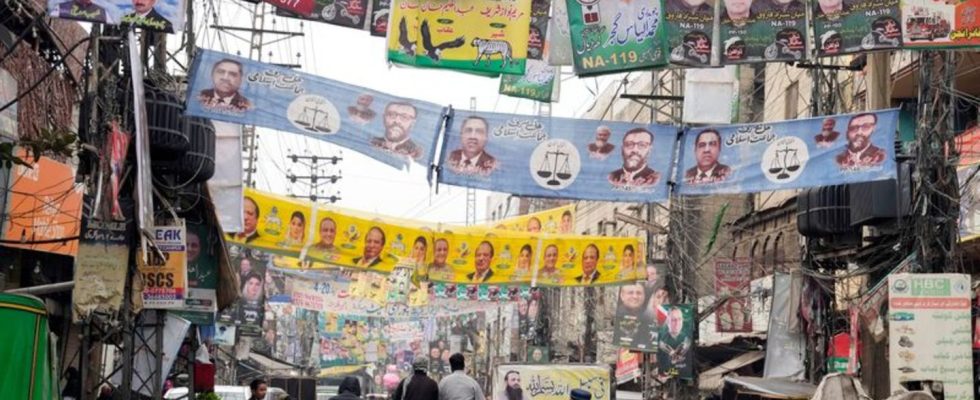General election
Pakistan: Family dynasties grab power
For months, political experts and human rights activists in the country have denounced unfair electoral conditions as Pakistan’s judiciary has largely dismantled the opposition. photo
© KM Chaudary/AP/dpa
The opposition in Pakistan complains of harassment, and former Prime Minister Imran Khan is in prison. Two major political dynasties are now fighting for power again.
As with previous elections, the election campaign was overshadowed by violence. At least 26 people were killed and dozens injured in two attacks in the restive Baluchistan province on Tuesday. It is not yet clear who is behind the crimes.
Opposition paralyzed – population disillusioned
For months, political experts and human rights activists in the country have denounced unfair electoral conditions as Pakistan’s judiciary has largely dismantled the opposition. Former Prime Minister Imran Khan, who is still popular with the population, is in prison on corruption charges. The 71-year-old politician sees himself as the victim of a political conspiracy and blames the powerful military for it.
Khan’s so-called Justice Party Tehreek-e Insaf (PTI) is also paralyzed because, according to a Supreme Court ruling, its members are only allowed to run as independent candidates. Dozens of cases have been pending against Khan since he was removed from office in a vote of no confidence in parliament in spring 2022. The former cricket star won the last general election in 2018. Turbulent political years followed.
Many of Pakistan’s 240 million people are disillusioned with the country’s elections and political leadership, as a survey by the Gallup polling institute last year shows. Accordingly, in a survey in autumn 2023, only 25 percent of those surveyed believed that the parliamentary election would be carried out according to the rules. During the most recent elections in 2018, the proportion was almost twice as high. 88 percent also said they believe corruption is widespread in government. The miserable economic situation and extremely high inflation played a particularly important role in the election campaign.
Sharifs versus Bhuttos – political dynasties fight for power
The election victory will now be fought primarily between the two major political dynasties of the Sharifs and Bhuttos. The favorites are the Pakistan Muslim League (PML-N) and its leading candidate, three-time prime minister Nawaz Sharif. Sharif only returned to his homeland from exile in Britain in the fall of 2023; in the meantime, his younger brother Shehbaz was, among other things, prime minister. Recently acquitted of old corruption allegations, the 74-year-old former prime minister has made a comeback. Sharif’s political clan, which also includes his daughter Maryam, is based in Punjab province, the country’s most populous and economically strongest region.
The outsider but Sharif’s most important opponent is the 35-year-old Oxford graduate and former Foreign Minister Bilawal Bhutto Zardari, who is running as the top candidate for the Pakistan People’s Party (PPP). The center-left party has been led by the Bhutto dynasty since its founding. Bhutto Zardari’s mother is the charismatic former Prime Minister Benazir Bhutto, who was assassinated in 2007.
The PPP and the PML-N were most recently part of a broad government coalition that overthrew Imran Khan. Bhutto Zardari told the local TV station Geo News on the evening before the election that further government cooperation with the Sharif brothers of the PML-N would be impossible for him if the PML-N continued with the same policies, as the newspaper “Dawn” reported. As is usual in Pakistan in the months before elections, a transitional cabinet is currently in power.
Since Pakistan’s independence over 75 years ago as a result of the partition of British India, there have been repeated unrest and instability in the country. The military ruled for more than half of this time. And even among civilian governments, generals were seen as the force that could decide the success or failure of the political leadership. To date, not a single Pakistani head of government has completed his term of office regularly.

